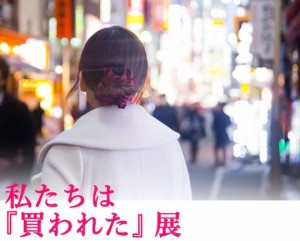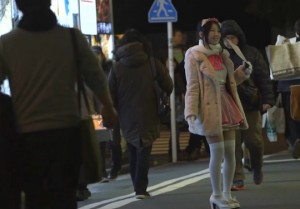Police warn schoolgirls in Tokyo against working in sleazy JK business
“Teenage girls luring men into dens of sleaze warned by police.”
It sounds like a headline on a parody news website. The men are lured into dens of sleaze by teenage girls. Oh, so the men are the victims?

But it’s not. It’s an article in the Asahi Shimbun and just the latest entry in a media frenzy about the JK business (“high-school girl business”) as the police continue their crackdown on what is often a thin cover for underage prostitution.
Twenty teenage girls suspected of working in the sleazy “JK business” were given a slap on the wrist by police in a series of street operations in Tokyo on April 8.
The girls, some in school uniforms, were standing on streets trying to lure men into the “shops,” which are a hotbed for prostitution.
In the so-called JK business men pay the youngsters to “go for a walk” or to have their pictures taken in swimsuits and other such questionable activities that often lead to sexual exploitation of the girls.
The girls aged 15 to 18 were warned not to work in the JK business ahead of the enforcement of an ordinance by the Tokyo metropolitan government that aims to restrict it.
The article practically paints the girls themselves as the villains in all this, which is hardly the approach that many sex workers in Tokyo would like the press to take. They would prefer more open acknowledgement of their jobs to encourage safety and better protection, as shown in a recent protest in the capital.
It is interesting how brazen this all is, though. The girls are even wearing their uniforms.
By 2020 and the Tokyo Olympics, don’t expect for the JK businesses to be so obvious. They will continue to thrive no matter how hard the police ostensibly crack down, since there is a demand, but it will be more hidden — and perhaps not in the current center of the industry, Akihabara.
There were 190 JK business facilities in the Tokyo metropolitan area as of December 2016 and about 120 of these were concentrated in the Akihabara district, a cosplay, anime and manga center in Tokyo.
From around 4 p.m. in Akihabara on April 8, about 80 police officers of the Metropolitan Police Department in Tokyo as well as volunteers started to talk to the girls in the streets.
The girls were clad in school uniforms and other costumes and handing out fliers. Police confirmed their ages and admonished those between 15 and 18 years old.
Similar operations were conducted in the districts of Shibuya, Shinjuku and Ikebukuro.
The central government has labeled this month “JK business awareness month,” and the police are being extra vigilant as at this time of year higher numbers of girls enter the world of vice due to spring vacation and the students moving up a grade in school.
The new ordinance by the Tokyo metropolitan government, which includes the inspectional authority of JK business outlets by the police, is scheduled to come into effect in July.
So July may be a Rubicon for the 2010s version of enjo kosai (compensated dating). The cafes and walking dates may disappear, but we reckon there will be new euphemisms, new covers and new operators waiting in the wings. They may just have to wait until after the 2020 Summer Olympics are over, though. After which, we predict the police and government will stop caring so much because the world also probably won’t be so fussed.
Right now many overseas media outlets are interested in JK businesses because, well, it’s a good story. (Granted, there might be some genuinely outraged journalists who do care about the exploited schoolgirls. We don’t wish to sound overly cynical.) Recent examples include reports by the BBC and Vice. Even the United Nations has, somewhat clumsily, weighed in on the issue, though Japan was quick to counter that claims that 13% of schoolgirls are engaging in compensated dating are exaggerated.














